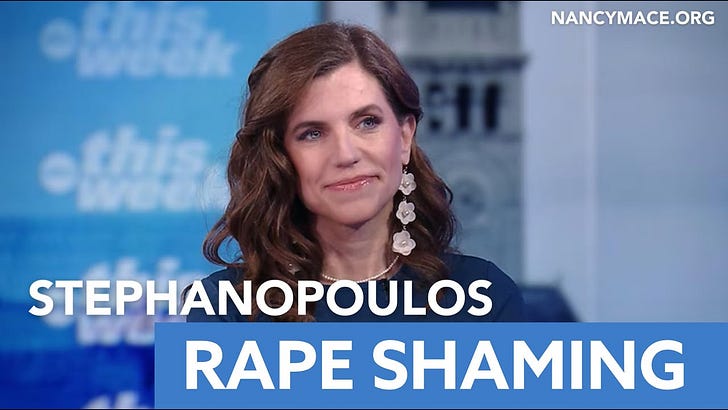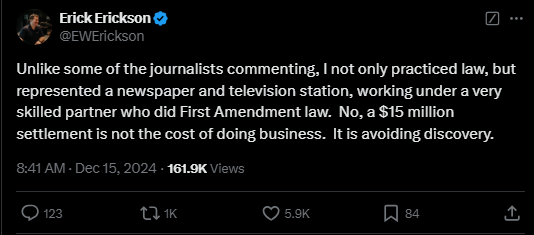Why ABC Settled With Donald Trump
George Stephanopoulos, who couldn’t resist saying “rape” instead of "sexual assault" in his March interview with Nancy Mace, did Trump an enormous favor.
ABC News recently agreed to a $15 million settlement to resolve a defamation lawsuit filed by Donald J. Trump.
The New York Times described it as a “significant concession” by a prominent news organization and a rare legal victory for Trump (whose past lawsuits against media weren’t very successful).
The settlement includes a $15 million donation to Trump’s planned presidential foundation and museum. Additionally, ABC News and anchor George Stephanopoulos issued a statement expressing "regret" over comments made about Trump. ABC News, a division of the Walt Disney Company, will also pay $1 million to cover Trump’s legal fees.
The lawsuit stems from this March interview (see below) Stephanopoulos did with Rep. Nancy Mace, in which Stephanopoulos repeatedly says (in various ways) that a judge and jury had found Trump guilty of rape, a reference to E. Jean Carroll’s civil lawsuit against Trump. (More on the suit in a minute.)
Following Trump’s legal victory, debate erupted over why ABC chose to settle.
“No way ABC would have lost in court,” tweeted economist Alex Tabarrok. “This is a payoff to avoid retribution.”
Many, including CNN’s Brian Stelter and conservative pundit Erick Erickson, suggested the settlement was to avoid discovery, a process that would have “unearthed emails or other internal ABC data that damaged the network’s case.”
I don’t doubt that avoiding discovery played a role in Disney’s decision to settle the matter. Yet I think there’s more to the story. Hot Air’s Ed Morrisey makes a case that “Disney had no choice” but to settle “and that the $16 million price tag may have been a far better discount than any found at its amusement parks.”
I think Morrisey basically has it right, and I’ll explain why.
Tabarrok’s confidence that Disney would have won in court stems from the fact that the Supreme Court’s decision in New York Times Co. v. Sullivan (1964) sets a very high bar for defamation, especially when the plaintiff is a public official. To establish their case, plaintiffs must demonstrate the usual elements of defamation—such as the publication of a false and defamatory statement to a third-party—and additionally prove that the statement was made with "actual malice."
In other words, plaintiffs must not just prove that what a third-party said about them was false, but that the false statement was intentional. This is no doubt why Tabarrok, a very good economist and accomplished thinker, immediately assumed that Disney settled to avoid the wrath of Orange Man.
Yet evidence has emerged that suggests Stephanopoulos was intentionally malicious in his comments.
The New York Post reports that Stephanopoulos was warned prior to the segment by a This Week producer to not use the word rape during the segment.
“The EP [executive producer] said it so many times,” a source told the Post.
Stephanopoulos decided to ignore this advice, which was no doubt given to avoid a legal blowup exactly like that which ensued. It’s also important to understand that Stephanopoulos didn’t make this statement casually.
As Byron York notes, no fewer than 10 times does Stephanopoulos say that Trump was found “liable for rape'“ in the Carroll case. The problem is, as Byron York notes, “the jury specifically found that Carroll did *not* prove that Trump raped her, even by the low standards in effect at the trial.”
People can decide for themselves if they believe that Trump was guilty of sexually assaulting Carroll, who alleges the act occurred in late 1995 or early 1996 (the fact that Carroll herself can’t decide which year the alleged act happened is a red flag for me).
Yet the facts are clear.
Carroll was awarded nearly $90 million in damages after a New York jury found Trump liable for sexual abuse and defamation under a New York law that allows victims of sexual assault to file civil suits beyond the statute of limitations.
The jury rejected the rape claims against Trump. (Jurors literally checked "No" on the rape question, York notes.)
Again, the bar for demonstrating “actual malice” is quite high. But as Morrisey notes, “the one sure way to prove it is to get testimony or documentation that the publisher of the defamatory conduct was warned not to publish it.”
If Stephanopoulos was warned to not say Trump was found liable for rape and then went on TV and hurled the accusation over and over, Morrissey is right: Disney and Stephanopoulos probably got off lightly. It’s unlikely that Trump’s legal team had these details, but if they had, they could have made things very difficult for Disney.
As it stands, Stephanopoulos has done Trump an enormous favor. Because Stephanopoulos couldn’t resist saying “rape” instead of “sexual assault,” the president-elect has more evidence to portray legacy media as a wretched hive of liars and fools, and many (especially in MAGA land) will take the legal settlement as proof that Trump wasn’t guilty of what Carroll claimed.





